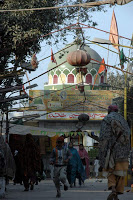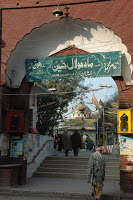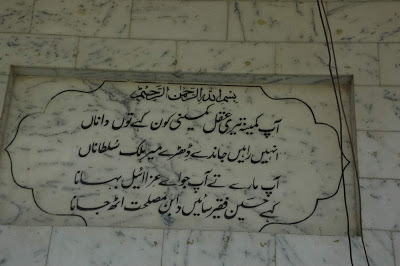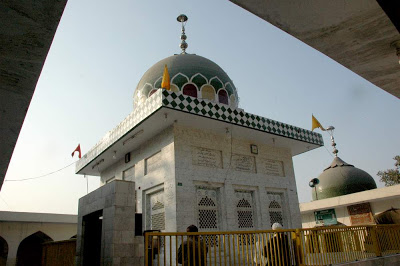Shah Hussain (1538–1599) was a Punjabi Sufi poet who is regarded as a Sufi saint. He was the son of Sheikh Usman, a weaver, and belonged to the Dhudha clan of Rajputs. He was born in Lahore. He is considered a pioneer of the Kafi form of Punjabi poetry.
Shah Hussain’s love for a Hindu Brahmin boy called “Madho” or “Madho Lal” is famous, and they are often referred to as a single person with the composite name of “Madho Lal Hussain”. Madho’s tomb lies next to Hussain’s in the shrine.
Outside the walls of the Shalamar Gardens in Lahore, there is held an annual festival at the time of spring harvest called “Mela Chiraghan” or the Festival of Lights, close to the grave of Lal Hussain. In the songs of the village minstrels and the dancers’ movements, the myth of Lal Hussain once again is reborn. Grandson of a convert weaver, Lal Hussain embarrassed everyone by aspiring to the privilege of learning.
Hussain’s poetry consists entirely of short poems known as “Kafis“, usually 4 to ten lines, designed for musical compositions, to be interpreted by the singing voices. The rhythm and the refrain are so balanced as to bring about a varying, evolving musical pattern… folk songs that draw on the emotional experience of the community…. record the reactions to the cycle of birth and the play of desire against the rhythms of hope , despair, exultation and nostalgia. Today most of these Kafis are sung, by well know singers and some have even been used as songs in the Indian Film Industry.
Short Documentry on Shah Hussain
Madho Lal Hussain’s Kafis
All translations are from Najam Hosain’s book “Madho Lal Hussain’s Kafis”.
Life’s Journey – limits & boundaries
Main wi janan dhok Ranjhan di, naal mare koi challey
Pairan paindi, mintan kardi, jaanan tan peya ukkaley
Neen wi dhoonghi, tilla purana, sheehan ney pattan malley
Ranjhan yaar tabeeb sadhendha, main tan dard awalley
Kahe Husain faqeer namana, sain senhurray ghalley
Travelers, I too have to go; I have to go to the solitary hut of Ranjha. Is there any one who will go with me? I have begged many to accompany me and now I set out alone. Travelers, is there no one who could go with me?
The River is deep and the shaky bridge creaks as people step on it. And the ferry is a known haunt of tigers. Will no one go with me to the lonely hut of Ranjha?
During long nights I have been tortured by my raw wounds. I have heard he in his lonely hut knows the sure remedy. Will no one come with me, travelers?
______________________
On separation
Sujjen bin raatan hoiyan wadyan
Ranjha jogi, main jogiani, kamli kar kar sadian
Maas jhurey jhur pinjer hoyya, karkan lagiyan hadiyan
Main ayani niyoonh ki janan, birhoon tannawan gadiyan
Kahe Husain faqeer sain da, larr tairay main lagiyaan
Nights swell and merge into each other as I stand a wait for him. Since the day Ranjha became jogi, I have scarcely been my old self and people every where call me crazy. My young flesh crept into creases leaving my young bones a creaking skeleton. I was too young to know the ways of love; and now as the nights swell and merge into each other, I play host to that unkind guest – separation.
____________
Female freedom
Ni Mai menoon Kherian di gal naa aakh
Ranjhan mera, main Ranjhan di, Kherian noon koori jhak
Lok janey Heer kamli hoi, Heeray da wer chak
Do not talk of the Kheras* to me,
Oh mother! Do not.
I belong to Ranjha and he belongs to me.
And the Kheras* dream idle dreams.
Let the people say, “Heer is crazy; she has given her-self to the cowherd.” He alone knows what it all means.
O mother, he alone knows.
Please mother, do not talk to me of Kheras.
*The Kheras were a wealthy family.
Complete Works of Shah Hussain

Shiraz Hassan is a magazine reporter and feature writer for Sunday Magazine in Lahore, Pakistan, where he covers social issues, art and culture. At the magazine, he has published more than 400 features related to social problems, culture and ‘show biz.’ Shiraz has also worked as a news editor at the radio network “MAST FM 103” in Lahore.
He writes about culture and heritage of South Asia, particularly Pakistan. He advocates rich culture of this land and tries to explore facts. Recently he was given an award from the Federal Ministry of Population Welfare for his article on population crises. Writers Guild also awarded him a Medal of excellence for his work.












